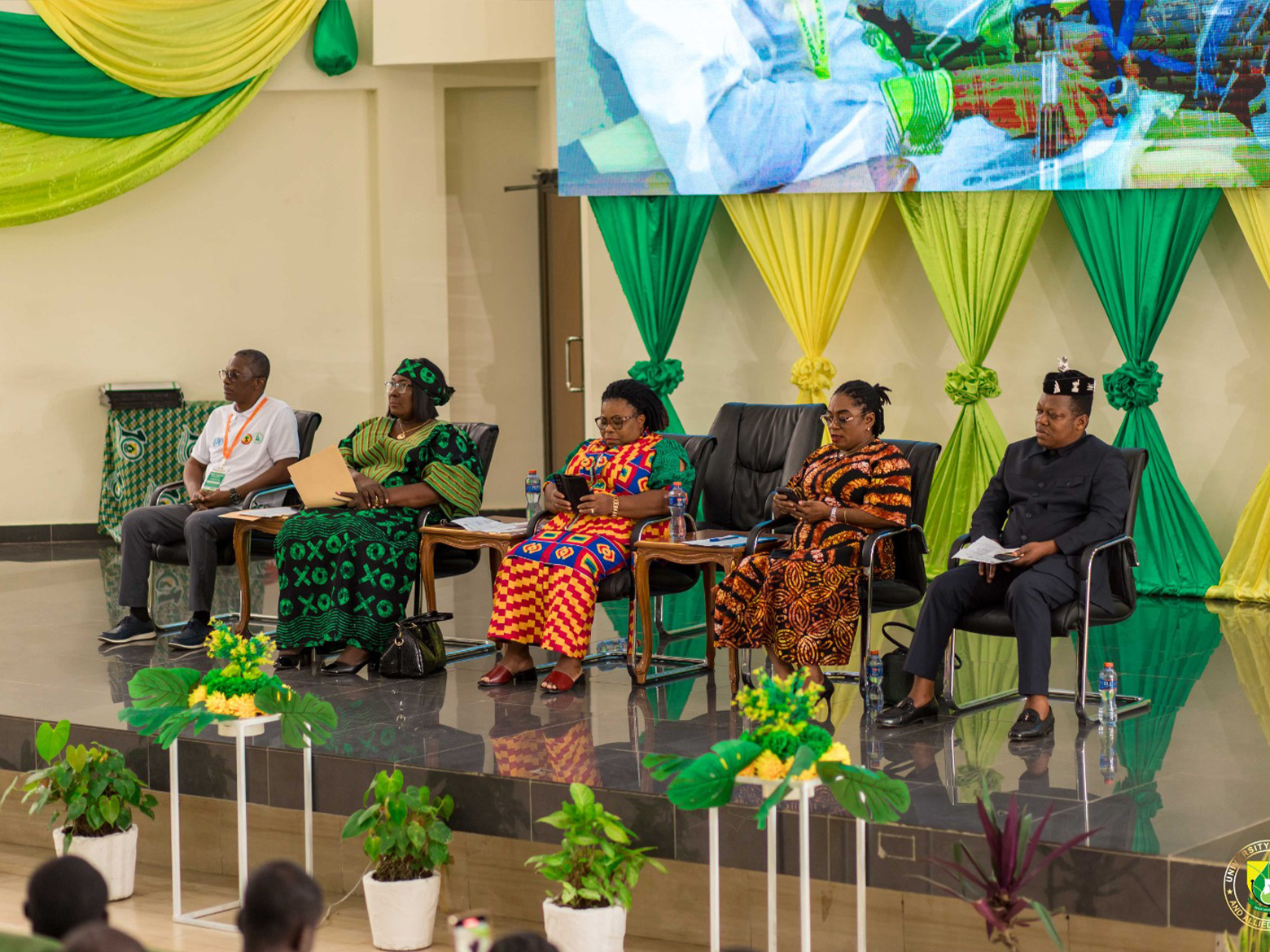
The Institute of Traditional Alternative Medicine (ITAM) of the University of Health and Allied Sciences (UHAS) in collaboration with the Ghana Federation of Traditional Medicine Practitioners’ Association (GHAFTRAM) hosted the maiden Professional Practice Course (PPC) for traditional medicine practitioners. The event took place from Tuesday, November 4 to Friday, November 7, 2025 at the main campus of the University at Sokode-Lokoe, Ho.
The Vice Chancellor, Professor Lydia Aziato in her address said that UHAS as a pre-eminent research health institution is eager to partner with traditional medicine practitioners to thrive, contribute to the successes of the association and together with other stakeholders make impact in society. She therefore charged the graduates that apart from the theoretical knowledge acquired at the training, there is the need to practically demonstrate their technical know-how as professional traditional medicine practitioners through a thorough health assessment of patients that is evidence-based before administration of herbal and alternative medicines.
She also encouraged the graduates to be well abreast with the changing trends and incorporate technology in their practice to improve their service delivery.
Professor Aziato applauded the graduates as the first cohorts of the course and facilitators for teaching and learning organized in both English and Ghanian languages (Twi and Ewe). She indicated that other phases of the course would be rolled out subsequently. She also appealed to stakeholders to collaborate with UHAS to have a state-of-the-art herbal farm of international repute and to establish a non-drug therapy centre at ITAM.
>>PHOTO GALLERY
Dr. Angela Ackon, Technical Officer of Quality and Safety, WHO Country Representative who represented the Country Director of WHO, said that in Ghana, an estimated 60 to 70 percent of the population rely on medicinal plants and traditional medicine for their healthcare needs and on the continent, 80 percent of the population depend on traditional medicine as the primary form of healthcare. Hence, these figures do not only remind us about how widely used traditional medicine is but also how deeply it is rooted in our cultures, identities and daily lives particularly in rural and underserved areas, she said.
Dr. Ackon stated that the challenges in traditional medicine including improper documentation and licenses called for an urgent need to structured training, proper regulation and better integration into the formal healthcare system. She therefore commend collaborators for the timely intervention to confront the rising burden of chronic diseases, lifestyle-related conditions and other environmental health challenges through rigorous curriculum that is both academically and culturally grounded such as models on ethics, sustainability, efficacy testing and proper documentation. She also encouraged stakeholders to ensure capacity building, policy integration, research and evidence generation and community engagement.
The Director of Traditional and Alternative Medicine, Ministry of Health, Dr. Anastasia Yirenkyi who represented the Minister of Health said that traditional medicine is not merely a heritage of the past but a vital assert to Ghana’s healthcare system particularly in communities where access to modern healthcare is limited. Therefore, there is the need to nurture, regulate and integrate it into broader healthcare system. She indicated that her outfit will continue to provide policy direction, coordination and oversight for the development of traditional and alternative medicine in Ghana.
Dr. Evelyn Abayaah Issah, Acting Administrative Secretary, Traditional Medicine and Practice Council (TMPC), who represented the registrar noted that the graduation marked the significant milestone to advance Ghana’s traditional and alternative medicine. The successful completion of the course shows the commitment of practitioners to learn and improve upon their service delivery in healthcare. Hence, the training will meet the evolving standard of practice that align with national and WHO strategy for traditional and alternative medicine. She added that the training will help the council to differentiate between the coax and recalcitrant practitioners in society.
Mr. Gordon Akurugu, Regional Head of Food and Drugs Authority (FDA), Volta Region, said as a regulatory authority they will continue to affirm all standards including market authorisation, registration of products and observe other compliance protocols. He mentioned that the ITAM product laboratory will help the FDA to register the products of practitioners in the region. He also appreciated UHAS management for the insightful course with key stakeholders on board.
The General Secretary of Ghana Federation of Traditional Medicine Practitioners Associations (GHAFTRAM), Mr. Okogye Abibiduro Nana Obiri on behalf of the Chairman GHAFTRAM said that the course has enlightened the graduates in critical aspects such as professional ethics, documentation, quality assurance and patient care. He stated that traditional medicine is not merely about healing but to uphold discipline, respect and excellence in service. He therefore challenged the practitioners to apply the knowledge acquired and promote ethical practice.
Ms. Yaa Amankwaa Opuni, Registrar, UHAS in her remarks indicated that the needed skills, knowledge and competencies acquired will enhance the work of traditional and alternative medicine practitioners to be more efficient and authentic with the help of the astute facilitators. She therefore charged the maiden cohorts to provide better care and improve service delivery through the certification course they have acquired as practitioners.
Professor Frank Edwin, Pro-Vice Chancellor, UHAS said that traditional medicine remains the first point of care in Ghana and on the continent, but the evolving demand of modern healthcare requires that practitioners are equipped with skills and knowledge to ensure safety, efficacy and professionalism. Hence, the comprehensive course is timely for the practitioners, he said.
Professor Kwame Benoit Nguessan Banga, the Director of ITAM, UHAS, retraited that as the health landscape evolves, the practicing also evolves. He therefore emphasized on WHO’s mandate to engage traditional and alternative medicine practitioners through training, research and policy regulations. With this, ITAM-UHAS has responded directly to the call with the PPC designed to equipped practitioners